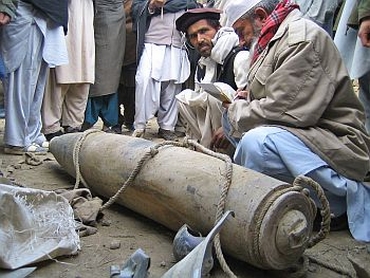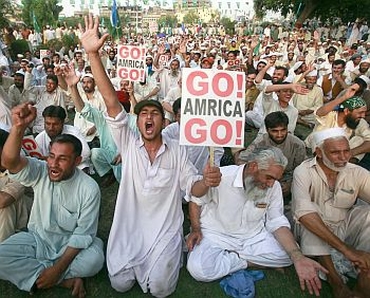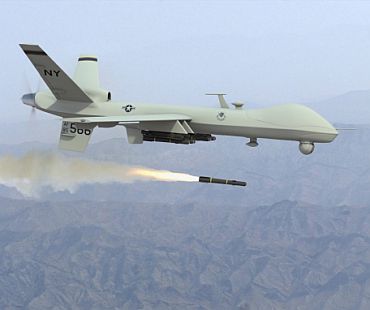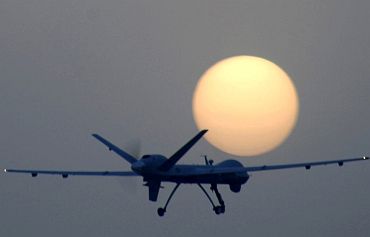Photographs: Alam Gir Bitani/Reuters
Warning that another 26/11 type attack could result in an Indo-Pak war, a former diplomat has highlighted the need for the United States to target the hideouts of the Lashkar-e-Tayiba in drone strikes in view of Pakistan's reluctance to act aggressively against the terror outfit.
"What we are suggesting is that we include LeT in this target list, because if the Pakistanis aren't willing to see this as a threat and indeed an existential threat to them, then we see it that way, and we're going to prosecute it," said Richard Armitage, former deputy secretary of state.
Armitage was speaking at the release of a report by an independent task force at the Council on Foreign Relations -- a Washington-based think-tank - on 'US Strategy for Pakistan and Afghanistan'.
'LeT is trouble'
Image: An anti-American rally in PeshawarPhotographs: Ali Imam/Reuters
The nearly 100-page report is authored by Armitage and two other experts on South Asia -- Samuel R Berger and Daniel S Markey.
"I would hope they would see the Haqqani network in the same way they see Pakistani Taliban, that this is ultimately a threat to them as well. On Lashkar-e-Tayiba, they have to see this as something that is -- that could be, in a single stroke, -- something that causes war between India and Pakistan, something that I think would delight Al Qaeda no end," he observed.
"And why do I say this? LeT is trouble. As I've already indicated, if they have one more strike, another Mumbai-type attack, I do not think the Indian government can be held back. But they're also in Afghanistan. They're killing us. I take it personally," said Armitage, who served as the deputy secretary of state between March 2001 and February 2005.
'We are dealing with a very dangerous situation'
Image: A US drone in action over North WaziristanPhotographs: Reuters
"If we can't be successful in the jawboning, pressuring or sticks-and-carroting them into this, then in the long run, we're dealing with a very dangerous situation," Armitage warned.
Markey said the report suspects an unstable US-Pakistan relationship because lesser progress by Islamabad against combating terror would hamper their ties.
"If we were to suffer an attack from Pakistan, we would be forced to, I think, take a very different line," he argued.
'Use all means necessary to root them out'
Image: A drone returns after a routine sortiePhotographs: Reuters
"So it's a recognition of that political reality, which leads us to look at what those alternatives would have to be. It's not a desire to go there, and it's not an inherent threat or anything that we're trying to level against the Pakistanis," he said.
"It's a recognition of the strategic reality that we both face and how uncomfortable that is for both sides," Markey noted.
Armitage argued that defeating and dismantling the LeT network is crucial for regional peace as well. "It's not totally necessary that drone strikes are the only weapon you have against LeT or, for that matter, the Haqqani network. The Afghan Taliban and the Quetta Shura and all of that, my own view is we ought to use all means necessary to root them out if we can't get assistance from Pakistan," he added.





article